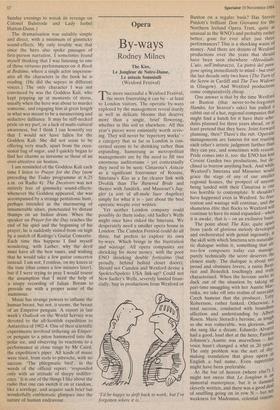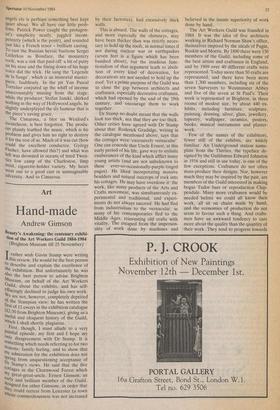Opera
By-ways
Rodney Milnes
The Kiss, Le Jongleur de Notre-Dame, Le astuzie femminili (Wexford Festival) ffihe more successful a Wexford Festival/
the more frustrating it can be — at least to London visitors. The operatic by-ways explored by the management reveal sturdy as well as delicate blooms that deserve more than a single, brief flowering, whether in this soil or elsewhere. All this year's pieces were eminently worth reviv- ing. They will never be 'repertory works' — a category that as far as London is con- cerned seems to be shrinking rather than expanding, hamstrung as metropolitan managements are by the need to fill two enormous auditoriums — yet contextually they need to be seen: Cimarosa's Astuzie as a significant forerunner of Rossini, Smetana's Kiss as a far clearer link with Dvotak than The Bartered Bride and thence with Janadek, and Massenet's Jug- gler (a sort of all-male Suor Angelica) simply for what it is — just about the best operatic weepie ever written.
Yet neither London company could possibly do them today; old Sadler's Wells might once have risked the Smetana. We desperately need a smaller opera house in London. The Camden Festival could do all three, but prefers to explore its own by-ways. Which brings in the frustration and wastage. All opera companies are shrieking for more money, with the poor ENO shrieking double fortissimo (but proudly, behind bolted closet doors). Should not Camden and Wexford devise a Spoleto/Spoleto USA link-up? Could not New Sadler's Wells, severely limited finan- cially, buy in productions from Wexford or 'I'd be happy to drift back to work, but I've forgotten where it is.' Buxton on a regular basis? Has Steven Pimlott's brilliant Don Giovanni for the Northern Ireland Opera Trust, quite as unusual as the WNO's and probably rather better, gone for ever after just three performances? This is a shocking waste of money. And there are dozens of Wexford productions over the years that should have been seen elsewhere —Herodiade, L'aio, nell'imbarazzo, La pietra del para- gone spring immediately to mind — but over the last decade only two have (The Turn -of the Screw in Cardiff and The Two Widows in Glasgow). And Wexford productions come comparatively cheap.
One answer is that by the time Wexford or Buxton (that never-to-be-forgotten Hamlet, for heaven's sake) has pulled a rabbit out of a hat, regional companies that might find a hutch for it have their sche- dules planned for three years ahead, or at least pretend that they have. Joint forward planning, then? There's the rub. Operatic managements are famous for not trusting each other's artistic judgment further than they can pee, and sometimes with reason Pride comes into it, too: the ENO has lent Covent Garden two productions, but de- clined to borrow anything back. And while Wexford's Smetana and Massenet would grace the stage of any of our smaller regional houses, the prospect of -anyone being landed with their Cimarosa is one too horrible to contemplate. It shouldn t have happened even in Wexford. So frUS- tration and wastage will continue, and the shameless elite that flocks to Wexford Will continue to have its mind expanded — when it is awake, that is — on an exclusive basis. The point about The Kiss, quite apart, from yards of glorious melody develop and orchestrated with genial ingenuity the skill with which Smetana sets natural's' tic dialogue within it, something that all: too-few composers today can manage. purely technically the score deserves the closest study. The dialogue is about two proud and obstinate lovers, a rustic Beat- rice and Benedick touchingly and trulY characterised. When the heroine seeks to duck out of the situation by taking op part-time smuggling with her Auntie Mar" tinka, we take off into realms of surrealist Czech humour that the producer, TribY Robertson, rather funked. Otherwise, a total success, conducted with boundless affection and understanding by Albert Rosen. Marie .Slorach's heroine, as tough as she was vulnerable, was glorious, and she sang like a dream; Eduardo Alvarei had a good, loud shot at the hero; Patricia Johnson's Auntie was marvellous — her voice hasn't changed a whit in 20 Years' The only problem was the sort of shr making translation that gives opera ill English a bad name. Even supertitles might have been preferable. At the bar of heaven (where else?) I might not swear that Le Jongleur is an, immortal masterpiece, but it is damneu, cleverly written, and there was a good dea' of snuffling going on in row N — but 11'1Y weakness for Madonnas, celestial visions,
angels etc is perhaps something best kept quiet about. We all have our little prob- lems. Patrick Power caught the protagon- ist's simplicity neatly, juggled incom- petently (which is the point), and sounded Just like a French tenor — brilliant casting. To cast the Russian heroic baritone Sergei Leiferkus as Boniface, the monastery cook, was a risk that paid off: a bit of putty on his nose and the fining down of his huge voice did the trick. He sang the `Legende de la Sauge', which is an immortal master- piece, faultlessly. In the pit Van Pascal Tortelier conjured up the whiff of incense unaccountably missing from the stage; While the producer, Stefan Janski, shirked nothing in the way of Hollywood angels, he slightly underplayed the sly humour that is the piece's saving grace. The Cimarosa, a blot on Wexford's escutcheon, is best forgotten. The produ- cer plainly loathed the music, which is his Problem and gives him no right to destroy It for the rest of us. Much of it was cut (how could the excellent conductor, Gyorgy Fischer, have allowed this?) and what was left was drowned in oceans of tired Twen- ties low camp of the Charleston, limp wrist, cigarette-holder variety. My heart went out to a good cast in unimaginable adversity. And to Cimarosa.















































 Previous page
Previous page